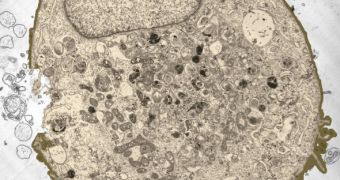Thus far, methods of treating cancer have been focused on identifying the infected or mutated cells, and somehow destroying every last one of them, so as to ensure that the tumor doesn't come back again. This method of fighting the disease has had several results, but general treatments such as chemotherapy or the radiation therapy do not work very well, mostly because they target an entire area, and do not discern between healthy and sick cells.
Stem cell therapy is still too far off and expensive to be considered for wide-scale implementation, and cancer continues to kill 13 percent of the people who die on Earth yearly. Moffitt Cancer Center Mathematical Oncologist Robert Gatenby proposes a new alternative, Wired informs.
The expert argues the fact that, rather than completely trying to destroy the cancer or tumor cells, doctors could focus on giving their patients a cocktail of medicines that would virtually ensure that the spreading of the disease is held back, perhaps indefinitely – basically, a stalemate. This would allow the patient to continue to live for far longer than they would have otherwise, while at the same time preventing the cancer from becoming immune to certain drugs, which is often the case today. Gatenby says he considers cancer to be a full, dynamic and evolutionary system, which cannot be wiped out that easily, in very much the same way destroying bacteria can really be a problem.
Since US President Richard Nixon declared the war on cancer, more than four decades ago, there has been little significant headway in the direction of compiling a cure for it, or at least for just one type of cancer. Sure, mortality rates have decreased, but that is mostly due to healthier lifestyles and the earlier detection of the disease. Not even nanotechnology can, at this point, fight the mutating disease, which has proven extremely resilient to most attempts of removing from its host. And that's exactly why Gatenby's “unorthodox” method may succeed, experts argue.
“It’s hard to convince doctors or patients not to give the maximum dose of chemotherapy and kill as many cells as possible, because that seems like the right thing to do. But the models suggest that it’s the wrong thing to do. The models suggests that we have to go against what’s intuitive,” he shares. The expert details his beliefs in an essay published yesterday (May 27th) in the journal Nature, and also in a study to be published next week in the prestigious medical journal Cancer Research.

 14 DAY TRIAL //
14 DAY TRIAL //